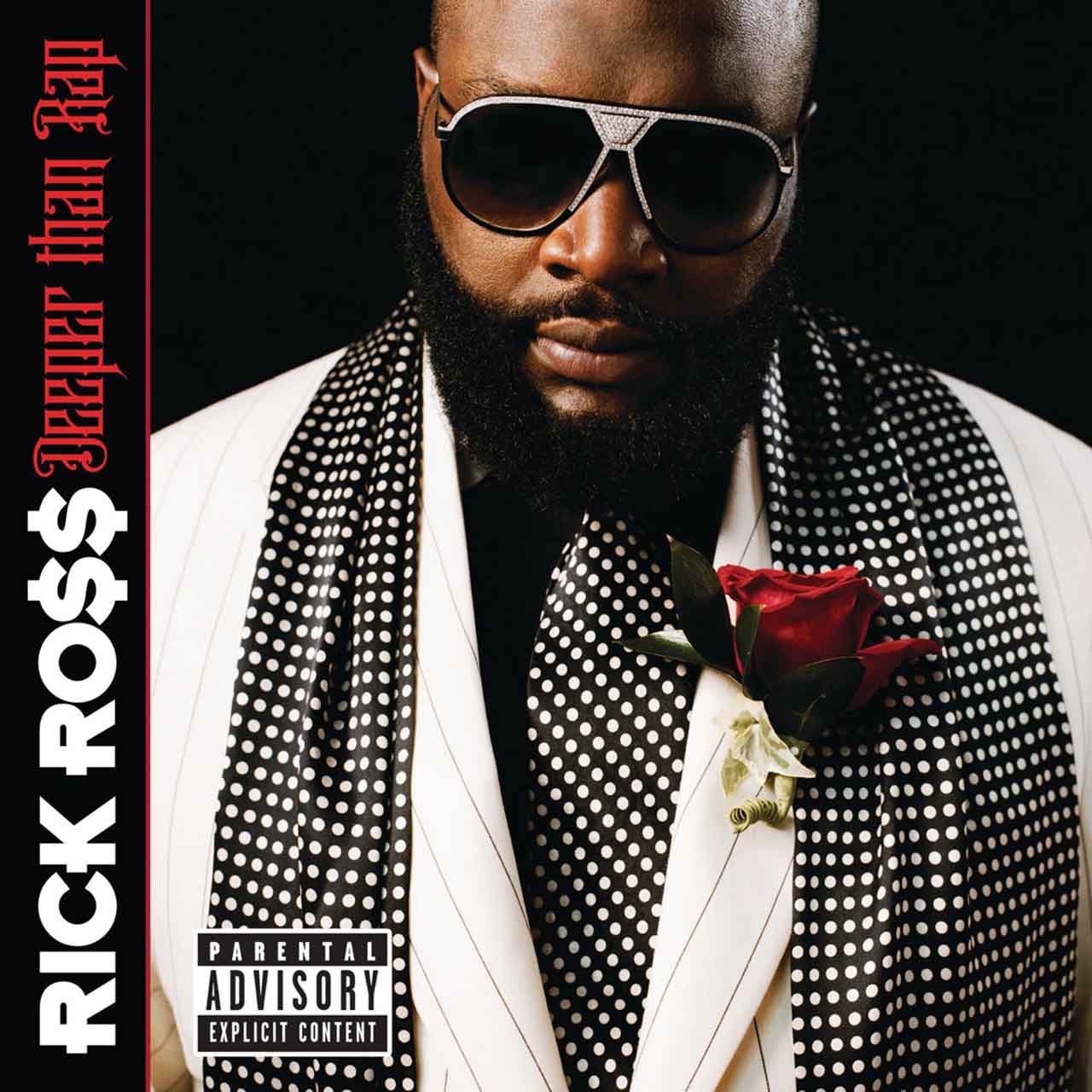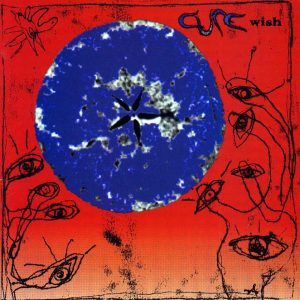By 2008, Miami MC Rick Ross had solidified his spot as one of hip-hop’s most promising new talents. His first two albums Port of Miami and Trilla were certified Gold, and rap lovers all over the country had grown accustomed to Ross’ husky voice, well-rounded projects, and sharp lyricism over excellent production.
Ross’ third album, 2009’s Deeper Than Rap, lived up to its name and helped introduce the world to a boss-like figure that mixed opulent songs like “Yacht Club” and street bangers like “Face” featuring fellow Miami native and longtime collaborator Trina.
While Ross already had two Gold albums under his belt by the time work began on 2009’s Deeper Than Rap, people like Ted Lucas, the founder of Slip-N-Slide Records, and Miami rap legend Trina, paint a picture of a Boss still learning the ropes.
Listen to Rick Ross’ Deeper Than Rap now.
The early years of Rick Ross
Ted Lucas: “What I seen was hunger, hunger and determination to really become – when he was talking that boss stuff – the best. He never wanted to settle. He’s the type to say, ‘I got to go get that.’ He wanted to be the best. So it was hunger and determination to be the best in what he does.”
Trina: “I heard about Ross in the streets being a local lyricist. He was buzzing underground and we know mostly the same people.”
Ted Lucas: “ I had to dumb Ross down because he was so lyrical. ‘Hustlin’’ was a prime example. He wouldn’t of dropped that record. I was like, ‘No, you can’t rap busy. You got to just catch the flow and let it go.’ What made me sign Ross when I signed him was I knew that cats up North were going to respect him and get it, and I knew he could relate to cats down South. When I first signed him, you could put Ross in a rap battle and he could eat someone up.
“Not too many cats from down South that you could put in a cipher and he’s going to eat it up. Honestly, over the years, we told him to scale it back a bit just to put his foot in the door. If you’re from up North, they’ll let you in the door on your lyrical content. But when you’re coming from down South, we just got to water it down and bring it back. [I told Ross,] ‘Once you get in the door, you can say to them, ‘Don’t play with me boy! I got lyrics, I got bars, I can rap.’’ That’s when he was able to get in. What took Ross so long to get in the game was that he had lyrical skills and spit bar for bar. That’s what made his lyrical content so strong.”
Trina: “I feel once he did ‘Hustlin,’’ it was every hood anthem. Everybody hustles everyday. So this became the signature ‘Boss’ motto. It set the tone for all the hustlers. He signified that Ross was officially ‘The Boss.’”
Ted Lucas: “Listen, it was a lot of work to get him not to just put a 24-bar verse inside an 8-bar verse. He would be rapping so much he would give you a 24-bar verse inside an eight-bar verse! He had to get his point across. We had to slowly get him to say, ‘Hey Ross, wait a minute! Once you get your foot in the door, you’re going to be able to let everybody know don’t play with you.’ But that’s what the whole thing was about.
“Everybody has their own lane: Trick Daddy was more on some thug, street, stay in the hood kind of thing. Trina was the female that everybody could relate to. Ross wanted to be the boss. He never wanted to be a worker, He never wanted to be normal. He always was like, “How can I be the boss?” So you know who you’re dealing with when you’re doing business with him because you know his vision. I understand he always wanted the best of everything. He always looked at everything big.
“Some other rappers would look at things and say, ‘Let me get the [convertible].’ Ross would say, ‘What’s the most expensive car out there right now?’ That’s why he named his company Maybach Music. At that time, the Maybach was one of the cars that he dreamed of and meant something to him. He knew what it was. He was the boss. Other people probably want their little share, Ross didn’t want his share. He wanted the whole pie.”
Trina: “Ross is family so [working with him] was a must. He gave me so much vision and direction. So when I had the chance to do my first video for a movie that Ice Cube was doing (2002’s All About The Benjamins) I told the label I had to give them a song featuring Ross (‘Told Y’all’). I wanted him to get that shine. This was a big video so I needed the Boss to be included.”
Ted Lucas: “Rest in peace to [former Def Jam A&R] Shakir Stewart. He really was the glue. Shake is what we called him, he was the one in the trenches that made everything work. So when it came to JAY-Z, he had already educated him so much on Rick Ross and Jay coming from an artist perspective, he knew what it was. When we met with Jay, there was nothing to talk about. He had already did his homework and Jay was like, ‘Let’s make it happen.’ There were no negotiations. He got it. From an executive point of view, [people] get greedy sometimes and you have to negotiate so hard because people want to talk you down on percentages or whatever. Jay just said, ‘Let’s get it done.’
”We preferred that we worked with someone with an artist’s point of view and that had worked with an independent label and we got it done in one day. That was a great move when Def Jam brought in JAY-Z. Def Jam was powerful at that time after the New York run. Jay brought life back to Def Jam and put them back on the map. All of this success was under his umbrella. Rihanna. Ne-Yo. Making a deal with him wasn’t hard at all and you’re learning from the man as you’re talking to him. Getting him to go into the booth for the ‘Hustlin’’ remix was unbelievable.”
Drumma Boy and “Face”
Grammy Award-winning producer Drumma Boy is a longtime fan of Miami hip-hop and has crafted hits for MCs like Jeezy and crooners like Usher. A frequent Rick Ross collaborator, Drumma Boy’s work on Deeper Than Rap consists of one of his favorite productions: “Face,” a booming, horn-driven collaboration with a guest verse from Trina.
Drumma Boy: “[With] Miami hip-hop, I think about Luke and about super uptempo, Freaknik-type [music]. It’s all about the bass and 808s. I also think about 69 Boyz, that whole era and of course Trina, Rick Ross and Slip-N-Slide [Records]. Miami is where everybody wants to go kick it, beautiful, and you can have a good time and have the best parties. It’s where it’s at.”
Trina: “It’s the southern sound, the swag, the way we say our words and talk. Ross has a deep husky voice, so his voice stands out naturally. The way he twist his words and says certain things are his own sound. That’s what makes [his sound] unique.”
Drumma Boy: “I always do me and just make music that’s dope and has got a vibe, a head knock. It’s going to make you groove, going to make you dance, it’s going to make you party, it’s going to make you smile and give you energy. As soon as you hear it you’re thinking about stories, what story I’ma tell on this? I paint the picture with the music. On Deeper Than Rap, doing ‘Face’ and finally being able to get Trina on a track… It was just a dope moment and still one of my favorite records.
”When I was making the beat [for ‘Face’], Ross was like, ‘I just want something club, something we can just mob to.’ I remember making the beat on some trap, dirty with the horns and it just came out a classic. I didn’t even know Trina was going to be on it. I remember him calling me up and playing me the record just like, ‘Damn that shit crazy. We got Trina on that thing, boy!’”
Trina: “I respect [Ross] as a man, as a brother, [so] when we work together it’s always family. When I first started working with him he would always makes sure I was comfortable and allow me to be myself. He’s always very inspiring when it comes to being creative. I remember I wouldn’t turn my album in unless he approved.”
Drumma Boy: “It’s really about your character. Who you are as a man. So many people get in where you from, where you at, but for me I can go anywhere. I travel the world and have a respect and give that respect. You receive what you give. If you give respect and pay homage and are always humble, the opportunities and introductions and relationships and referrals and things of that nature, most of the time things are going to go well for you. People are going to want to put opportunities in your pocket and give you the first call for gigs and things like that.
“That was the most important thing for me coming out of Memphis [and connecting with Ross]. If I earn my respect, I’m going to to start getting paid because people respect me. Ain’t nobody going to pay you if they don’t respect you. And then comes the power. Then we become powerful because of the relationships, because of the longevity, because of the consistency. Consistently being able to deliver and being able to generate millions for artists all across the world and all across the nation. That’s what it’s about for me: character and respect.”
Rick Ross’ work ethic
By the time Deeper Than Rap dropped in 2009, Rick Ross survived a beef with the seemingly invincible 50 Cent and was finally getting the mainstream attention he worked years to earn. Rick Ross’ Maybach Music imprint was finally off the ground and would help push promising MCs like Meek Mill and Wale to new heights. For people that worked with him and watched his growth over years, his success was no accident.
Ted Lucas: “When Ross first started and ‘Hustlin’’ was out, he had three or four shows a day and he was going to do them all. ‘Find a helicopter, we’re doing it,’ is what he would tell you. ‘The other cities, we wouldn’t get there in time if we drive; if it’s three hours away, a helicopter can get us there in 45 minutes. Make it happen,’ he’d say. That’s him. You can’t tell him no. The only person that was going to tell him no is Jesus Christ. Everybody in the street knew that. He’s going to outwork you, and that’s going to motivate you to work. It makes you stay on your game. Because you know with him, he wasn’t going to take it easy. He’s going to keep pushing. Ross was putting out two albums in two years and nobody was doing it at that time. Every 36 months we were putting out an album. Back then. He was always working on his craft. He wasn’t playing.
”[I wanted to help Ross learn] business structure. Ross did everything from a dope boy perspective. In his eyes, if it could be done from the streets, it could be done. He had to get the understanding of short-term business, of publishing deals. Things like that. The other side of the corporate world, because he wasn’t ready to understand that when he first started. When we first started, he had everything like the streets. If you could do it there, you could do it anywhere.
”We signed our deal with Def Jam and we had everybody and their mama trying to sign us to a deal, but I told him I wasn’t in a rush to do anything because I wanted him in the best situation not only for myself but him, as well. I had to find a deal that worked for the both of us and made the best sense for him. I knew his vision was not only as an artist. He had people like DJ Khaled all in the game. Not too many artists can do that in one city. Everybody in [Miami] believed in him.”
Drumma Boy: “[Ross] is one of the most inspirational artists out for me. Between him and Gucci [Mane], you just love those guys. You love working with them. When they call you or when they reach out and say, ‘It’s time,’ you know what time it is. That’s all he’s got to say. I always got a folder for my favorite artists. I got a secret folder for all of my favorite artists, so when they call me, I’m already locked and loaded and ready. And if you want to cook up something from scratch, we can do that, too. Always being prepared is like, once you’re legendary, once you’re a vet, you might be at the house just chilling and when they call you, it’s game time.”
Ted Lucas: “Ross would come from the club and do five songs based on what he’d seen that night. Most people, they’ll leave the club and they got to go have a baby, make love to somebody or something. But Ross is different. Ross will go back, do five songs that night, wake up in the morning after sleeping for three hours and do ten more songs. I guarantee you, Ross’ engineer probably has 1,000 songs he never released. Easy. His work ethic was that unbelievable. You couldn’t go to sleep before him, and you better be up before him.
”I knew once he got his foot in the door what it was. [Ross] had it in mind before he even had hit records that he would travel around the world and do big concerts. Some people just want to get their money and go home. He wanted everything. Whatever this game had to offer and what comes with it, he didn’t care what it would take to go do it. You don’t find that every day. People get content very easily. I don’t think he even knows what that word means. “He was waiting to show people that. Coming from down South, you’re coming off of all kinds of rappers that were more into a vibe and not as much lyrical content. Ross was able to make you [rewind] the song and listen to what he said. Lines he was saying could make you tell he read books. He’s a smart brother, he isn’t crazy. He perfected his craft. He went in to get himself ready and when his time came he took advantage of it. Anybody could’ve gotten signed to Def Jam and would’ve been happy and stopped right there. Not Ross.”
After the release of Deeper Than Rap, Rick Ross’ skills for consistently creating hip-hop that captivated listeners all over the United States moved him from a class of successful newcomers to gifted all-time greats. His penchant for lush, soulful production as the backdrops for his intricate, cinematic lyrics finally carved out a niche for what listeners could come to expect from him. Deeper Than Rap would also set up one of Ross’ most well-known projects, Teflon Don. Long live The Boss.
Listen to Rick Ross’ Deeper Than Rap now.
Editor’s note: This article was originally published in 2019.




